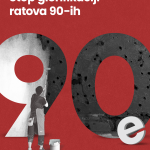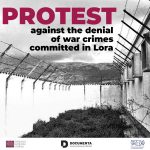19/09/2010 Announcement on publication of the translation of the report of the European committee for the Prevention of Torture and inhuman or Degrading Treatment or Punishment (CPT)
19/09/201021/09/2010 Response of HRA to the reaction of the Government of Montenegro on our press release regarding publication of the CPT Report
21/09/201019/09/2010 Response to the reaction of the Association of 1990s Wars Veterans [of Montenegro] on the initiative to allow extradition of nationals charged with war crimes by neighboring states
1. Reaction of the Association of 1990s Wars Veterans against our initiative to include extradition of own citizens responsible for war crimes in the Agreement on Extradition between Montenegro and Croatia, along with the accused of organized crime and corruption, we considered useful. It encourages further discussion on this important topic, which the state officials, unfortunately, decided to ignore.
2. We appreciate the concern of the organization which brings together the participants of the war in Croatia that “in a situation where the Croatian side still refuses to confront its own responsibility for war events and ignore the existence of war crimes committed by its armed forces against Montenegrin citizens, the acceptance of the initiative would result in one-sided extradition of Montenegrin citizens to Croatia”- yet we do not share such concern for the following reasons:
We do not accept the argument of reciprocity on the basis of citizenship in terms of
prosecution of those responsible for war crimes, considering it opposite to the principles of fairness, rule of law and equality of human rights for all people, and especially the victims. From our previous work it is obvious that, primarily, we advocate for the prosecution of crimes committed on our behalf, by the citizens of the countries we work in, and then all other criminals, so that all the victims, regardless of their nationality, are able to achieve justice. In other words, insisting on balance between the numbers of perpetrators of crimes among the citizens of our countries will not bring justice to the victims.
As for the claim that Croatian side refuses to face the responsibility for crimes against Montenegrin citizens, having no intention to prejudge the possible discovery of other such crimes, we assume that the Association of 1990s Wars Veterans had in mind the crime of the Military Investigation Centre “Lora” in Split, for which, in their previous public announcements, they argued that it also includes the crime against Montenegrin citizens, which has still not been processed in Croatia. We believe it is too harsh to claim that Croatia is not ready to prosecute crimes against the citizens of Montenegro, given that it has already completed two proceedings for the above mentioned crimes in “Lora” against (mainly) Serbian citizens, and that the third such proceeding that would have to include crimes against the citizens of Montenegro is in preparation. What we can do together is investigate whether the Croatian State Attorney’s Office received information about the crimes in “Lora” committed against Montenegrin citizens and whether they will be included in the new proceeding.
3. Regarding legitimate problematizing of “numerous Croatian indictments against the former JNA (Yugoslav People’s Army) soldiers, which were the subject of criticism of the EU member states’ due to their lack of substance”, we draw attention to the fact that the existing extradition agreements allow the requested state not to extradite a person for whom the evidence is not provided in terms of the existence of reasonable doubt that the person committed a crime charged for. Thus the agreements on extradition including the accused for war crimes would, in fact, enable review of indictments, put an end to uncertainty and allow Montenegro to see the evidence that actually exists for those crimes. We also bring to attention the belated but important possibility to renew the proceedings that were validly concluded in the absence and in the case when the person convicted is not accessible to the Croatian judiciary. Starting from 1 January 2010 those proceedings can be started again by the Croatian State Attorney’s Office or by a person convicted in his / her absence. It is also important that as of 15 July 2010 it is possible to access the list of persons convicted in Croatia and Serbia, indicted or under investigation for war crimes. The lists are available at the Ministry of Justice of the Republic of Croatia and the Ministry of Justice of the Republic of Serbia.
4. Finally, we are concerned about the fact pointed to by the Minister of Justice of Montenegro, Mr. Radovic, that neither Montenegro, nor Croatia or Serbia even discussed the possibility to include war crimes, along with organized crime and corruption in the agreements on extradition of own citizens, because that very fact indicates the existence of problems that are callously ignored.
Ljupka Kovacevic, coordinator of Center for Women and Peace Education ANIMA, Kotor
Tea Gorjanc Prelevic, executive director of Human Rights Action, Podgorica
Daliborka Uljarevic, executive director of Center for Civic Education, Podgorica
Velija Muric, president of Montenegro Committee for Human Rights, Rozaje
Vesna Terselic, head, Documenta – Centre for dealing with the past, Zagreb
Zoran Pusic, Civic Committee for Human Rights Zagreb
Katarina Kruhonja, Centre for Peace Nonviolence and Human Rights Osijek







 English
English